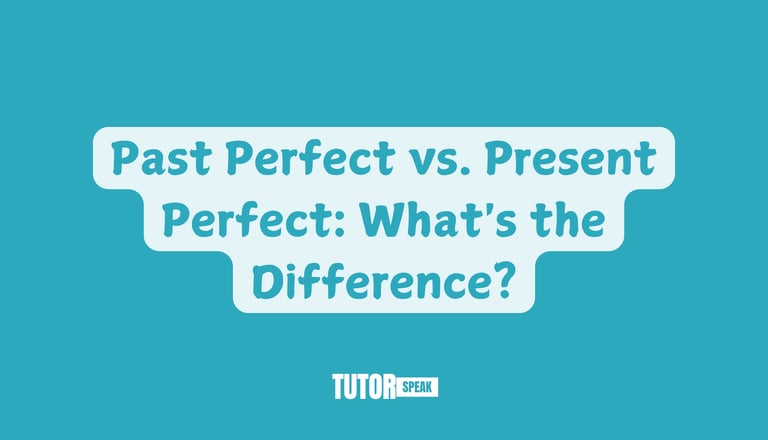Past Perfect vs. Present Perfect: What's the Difference?
When learning English, understanding how to use Past Perfect and Present Perfect correctly can be tricky. Both tenses deal with past events, but they are used in different contexts to convey distinct meanings. In this article, we will explore the key differences between Past Perfect and Present Perfect, explain how and when to use each tense, provide examples, correct common mistakes, and give exercises to help you practice.
TutorSpeak
3 min read


Past Perfect vs. Present Perfect: What's the Difference?
When learning English, understanding how to use Past Perfect and Present Perfect correctly can be tricky. Both tenses deal with past events, but they are used in different contexts to convey distinct meanings. In this article, we will explore the key differences between Past Perfect and Present Perfect, explain how and when to use each tense, provide examples, correct common mistakes, and give exercises to help you practice.
Past Perfect vs. Present Perfect: Key Differences
1. Past Perfect
The Past Perfect tense is used to describe an action that was completed before another action in the past. It is used to show the order of events in the past and often emphasizes which action happened first.
Structure:
Subject + had + past participle
Examples:
By the time I arrived, they had left.
She had finished her homework before the movie started.
We had never visited London before we moved there.
Key Points:
Describes an action that happened before another past action: "He had eaten lunch before the meeting started."
Often used with time expressions such as by the time, before, after, when: "I had completed the report by 5 PM."
Focuses on an event completed in the past that had an effect on another past event.
2. Present Perfect
The Present Perfect tense is used to describe actions that occurred at an unspecified time in the past but have a connection to the present. It can be used to show the experience or actions that started in the past and continue into the present.
Structure:
Subject + has/have + past participle
Examples:
I have visited Paris twice.
She has finished her homework already.
We have lived here for five years.
Key Points:
Describes actions that have relevance to the present moment: "I have lost my keys (and I can't find them now)."
Used with time expressions like ever, never, since, for, recently, yet: "She has been to London before."
Indicates actions that started in the past and may still be ongoing: "They have known each other for 10 years."
Common Mistakes with Past Perfect and Present Perfect
1. Mistake: "I have seen him yesterday."
Correction: "I saw him yesterday."
Explanation: Present Perfect is not used with specific time expressions like "yesterday," "last week," or "in 2005." These expressions are used with the Past Simple.
2. Mistake: "By the time I arrived, they have left."
Correction: "By the time I arrived, they had left."
Explanation: The Past Perfect is needed here to show that one action (leaving) was completed before another action (arriving) in the past.
3. Mistake: "She had finished her work and then she has gone home."
Correction: "She had finished her work and then she went home."
Explanation: Past Perfect is used for the first action (finishing work), and Past Simple is used for the second action (going home). The Present Perfect is incorrect here because the event is finished and doesn't have a direct connection to the present.
4. Mistake: "I had never visited Paris, but I have now."
Correction: "I had never visited Paris before, but I have now."
Explanation: The Past Perfect should be used to describe the past action (never visiting Paris) before another past event, while Present Perfect is used to describe an action with present relevance (I have now).
Exercises to Practice Past Perfect and Present Perfect
Exercise 1: Fill in the blanks with the correct form of the verb (Past Perfect or Present Perfect).
I __________ (see) that movie before.
By the time I arrived, they __________ (already leave).
She __________ (never be) to Japan before.
They __________ (live) in that house for ten years when they decided to move.
We __________ (finish) our homework already.
He __________ (work) at that company for five years when he got promoted.
I __________ (read) the book you gave me.
Exercise 2: Correct the mistakes in the following sentences.
By the time we arrived at the party, everyone has left.
I have completed my report when I realized I made a mistake.
She had finished her project already.
They have known each other since five years.
I have never seen such a beautiful painting before.
Exercise 3: Choose the correct tense (Past Perfect or Present Perfect).
I __________ (have eaten / had eaten) lunch when you called me.
They __________ (have worked / had worked) on the project all week.
He __________ (has lived / had lived) in London before he moved to Paris.
We __________ (have finished / had finished) the task before the deadline.
She __________ (has visited / had visited) many countries by the time she turned 30.
Exercise 4: Write sentences using the following prompts (Past Perfect or Present Perfect).
I / already / see / the movie / when / she / arrive
He / never / be / to New York / before
They / know / each other / for / ten years
She / already / finish / her work / by the time / I call
We / move / to a new house / last week



